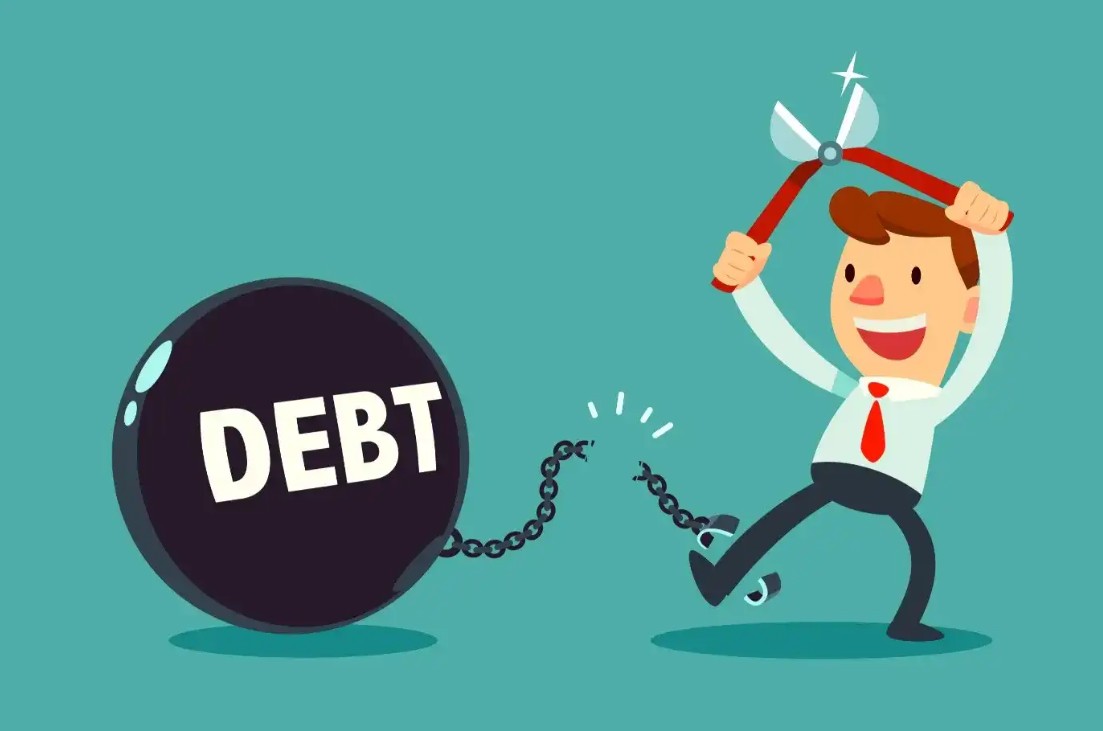Cash Store Blog
Mastering Debt: Your Comprehensive Guide to Effective Debt Management
Debt can sometimes feel like an unwelcome companion as we make our ways through life. But we’re not alone. In fact, recent data tells us that consumer debt in the United States reached $17.06 trillion in 2023, marking a 4.15% increase from the previous year, according to the Federal Reserve Bank of New York. And, average credit card debt sits at $6,365, mortgage debt at $241,815, auto loan debt at $23,479, and personal loan debt at $11,850.
Now, having some debt is okay – it's like having a credit card in your wallet. But just like that credit card, you need to manage it wisely so it doesn't take over your life. Debt doesn't have to be a scary beast; it can be tamed and conquered.
This blog is your roadmap to triumph over debt. Whether you're wrestling with credit card balances, juggling student loans, or facing other financial obligations, this guide is designed for you. Let's embark on a journey together, discovering practical strategies and insights to manage your debt effectively and pave the way for a healthier financial future.
Debt Management 101: Understanding Different Types of Debt
Debt management is like bringing order to the chaos of your finances. It's a strategic approach involving financial planning and budgeting to rein in your debts. The goal? Lower your current debt and pave the way toward its eventual elimination and mastering your finances. It's important to note that this is not to be confused with a debt management plan with a credit counselor – though we'll touch on that option later in this article.
Now, let's explore the different forms of debt that might be knocking on your financial door:
- Credit Card Debt: The plastic card in your wallet can be a double-edged sword. It's convenient, but high-interest rates can quickly turn a small balance into a big problem.
- Student Loans: Education is an investment, but student loans can linger long after graduation. Understanding repayment options and interest rates is key.
- Mortgages: Buying a home often involves taking on a mortgage. The terms and interest rates can significantly impact your financial health.
The impact of interest rates is important to understand. In the third quarter of 2023, the average APR for all accounts soared to 21.19%. It's a jump from the previous quarter, which shows the need for vigilant debt management—additionally, personal loan interest rates average 11.54%, varying based on creditworthiness and financial stability.
Assessing the urgency of different debts and prioritizing repayment is the first step in effective debt management. Stay tuned for our next section, where we'll provide recommended debt payment strategies to help you tackle your financial challenges head-on.

Developing a Debt Repayment Plan for Better Budget Management
Creating a family budget (or an individual budget if you are flying solo) is like charting a course for financial success, and the 50/20/30 plan is a trusty map to guide you.
Here's the breakdown: allocate 50% of your after-tax income to cover needs—essentials like housing, food, and transportation. Let 30% cater to wants, from dinners out to vacations. The remaining 20% is your ticket to financial stability, covering debt repayment and savings, including credit card payments and contributions to your financial future, like retirement.
Now, let's talk debt repayment strategies. The debt snowball method involves paying off your smallest debts first, creating momentum. On the other hand, the debt avalanche tackles high-interest debts first, saving you money in the long run.
Whichever strategy you choose, never neglect your minimum payments elsewhere. Late payments can take a toll on your credit score, affecting your financial health. Be diligent in meeting your commitments.
Negotiating with creditors is a skill worth mastering. Reach out to ask for better terms, lower interest rates, or even negotiate a settlement. Additionally, exploring refinancing options can provide relief, potentially reducing interest rates and monthly payments.
Developing a debt repayment plan isn't just about the numbers; it's a strategic move toward financial freedom. With the right plan, dedication, and a sprinkle of negotiation skills, you're well on your way to a healthier financial future. Stay tuned for more insights on effective debt management in the next section.
Building Healthy Financial Habits
When it comes to your financial well-being, cultivating healthy habits is key. Let's explore some tips for responsible spending and avoiding the pitfalls of additional debt.
Tips for Responsible Spending
Responsible spending is the cornerstone of effective debt management. Track your expenses, create a realistic budget, and differentiate between needs and wants. Before making a purchase, ask yourself if it aligns with your financial goals.
Here are some tips to help keep you on track:
- Budget Wisely: Create a realistic budget that aligns with your financial goals and prioritize essential expenses over non-essentials. Managing your finances with a budget is a must.
- Track Your Expenses: Use tools and apps to monitor your spending habits, allowing you to identify areas for improvement and maintain financial awareness.
- Question Before Purchasing: Before making a purchase, consider its impact on your financial well-being and avoid impulse buying by thinking about the long-term consequences.
- Prioritize Financial Goals: Align spending decisions with your financial goals, focusing on investments that contribute to long-term stability rather than immediate gratification.
- Stay Informed: Keep yourself informed about discounts, promotions, and cost-saving opportunities, and regularly review your budget to ensure it reflects your current financial situation and goals.

Establishing an Emergency Fund
Life is unpredictable, and having an emergency fund can provide a much-needed financial safety net in certain situations. Set aside a portion of your income to cover unexpected expenses. This fund acts as a shield, preventing the need to accumulate more debt when life throws curveballs your way.
Seeking Professional Help and Financial Counseling
Sometimes, the journey to financial wellness requires a guide. Credit counseling organizations can provide valuable assistance. These non-profit organizations, staffed with certified and trained counselors, offer a range of services. From advising on money and debts to developing budget plans and organizing debt management strategies, their goal is to empower you with the tools needed for financial success.
Working with a credit counselor is a practical way to receive expert advice without breaking the bank. They can help you manage your money, develop a budget, obtain your credit report, and even organize a debt management plan tailored to your unique situation.
Long-Term Debt Management
Debt management is no short sprint; it's a marathon with numerous sprints along the way. Understanding that it's a journey, not a quick fix, is crucial. Let's look into strategies for staying motivated throughout the repayment process.
- Scenario Evaluation: When tempted to make a purchase, ask yourself if it aligns with your financial goals or if it's a fleeting desire. Emotions often drive purchases, so recognizing the emotional aspect can help in making informed decisions.
- Shopping Addiction Awareness: Shopping addiction, also known as compulsive shopping disorder, can derail your debt management efforts. Recognize the signs, seek support, and consider professional help if needed.
- Credit Monitoring and Utilization Management: Keep a close eye on your credit scores and manage credit utilization. The FICO score range, from 300 to 850, deems a score between 670 and 739 as good. Understand the impact of credit on your financial health.
Planning for a Debt-Free Future
Around 23% of Americans are debt-free, embracing a lifestyle that factors in various debts. While definitions may vary, planning for a debt-free future involves wise financial decisions, including mortgages and responsible credit card use without carrying a balance.
In the long-term debt management journey, staying motivated, understanding emotional triggers, and planning for a debt-free future are crucial components. Monitoring credit scores and being aware of potential pitfalls ensure a steady pace toward lasting financial health.
Resources and Support for Ongoing Debt Management
Setting yourself on the path of ongoing debt management doesn't mean you're alone—there's a plethora of resources and support waiting to assist you.
Online Tools and Apps
Leverage the power of technology with online tools and apps designed for debt tracking and management. Platforms like Mint, YNAB (You Need a Budget), and Debt Payoff Planner help you stay organized, set goals, and monitor your progress in real-time.
Community Support and Forums
Connect with others on the same journey through community support and forums. Share experiences, exchange tips, and find encouragement in spaces like Reddit's Personal Finance community or debt-focused forums. Knowing you're not alone can be a powerful motivator.
Consider a Financial Advisor or Credit Counselor
If the journey feels overwhelming, consider the expertise of a financial advisor or credit counselor. These professionals can provide personalized guidance, helping you navigate challenges, create a tailored debt management plan, and offer financial education to empower you in making informed decisions.
Remember, ongoing debt management is a dynamic process, and utilizing available resources ensures you have the tools and support needed for success. Whether it's the convenience of an app, the camaraderie of a community, or the expertise of a professional, these resources complement your efforts, making the journey toward financial freedom a collective and achievable goal.

Mastering Debt for Financial Freedom
As we wrap up our comprehensive guide to mastering debt, let's recap the key takeaways that pave the way for financial freedom:
- Understanding Debt Types: Identify and comprehend various forms of debt, from credit cards to student loans and mortgages.
- Strategic Repayment Plans: Develop a family or personal budget, utilizing the 50/20/30 rule, and choose effective repayment strategies like the debt snowball or debt avalanche.
- Building Healthy Habits: Cultivate responsible spending habits, establish an emergency fund, and seek professional guidance when needed.
- Long-Term Debt Management: Acknowledge that managing debt is a journey, not a quick fix, and implement strategies for sustained motivation.
- Utilizing Resources: Leverage online tools, community support, and consider financial advisors or credit counselors for ongoing assistance.
As you navigate your debt management journey, remember that you're not alone. For more insights and practical tips, follow the Cash Store blog. And, if you find yourself in a pinch, consider a cash loan or installment loan from the Cash Store—providing a reliable resource to manage unexpected expenses while you work towards your financial goals.
Your journey to financial freedom starts with informed decisions and strategic steps, and we're here to support you every step of the way.


